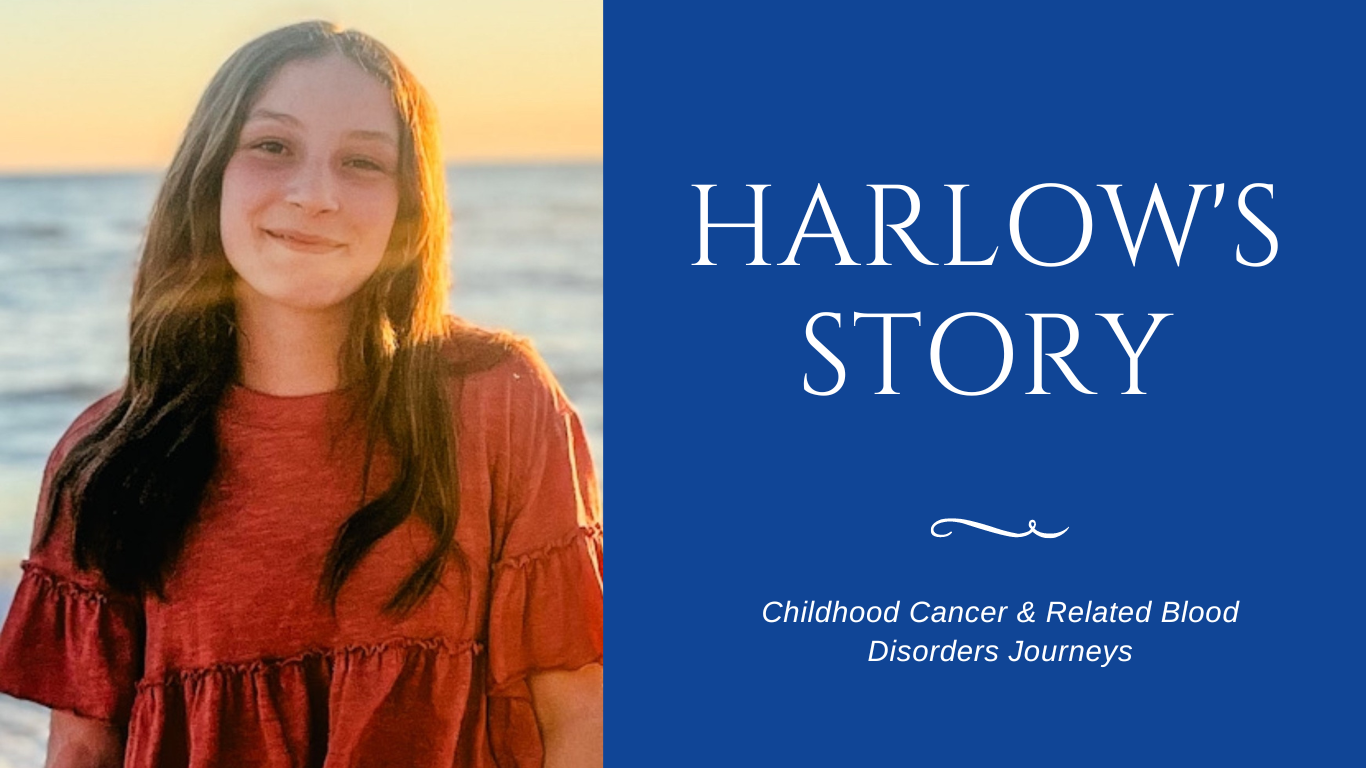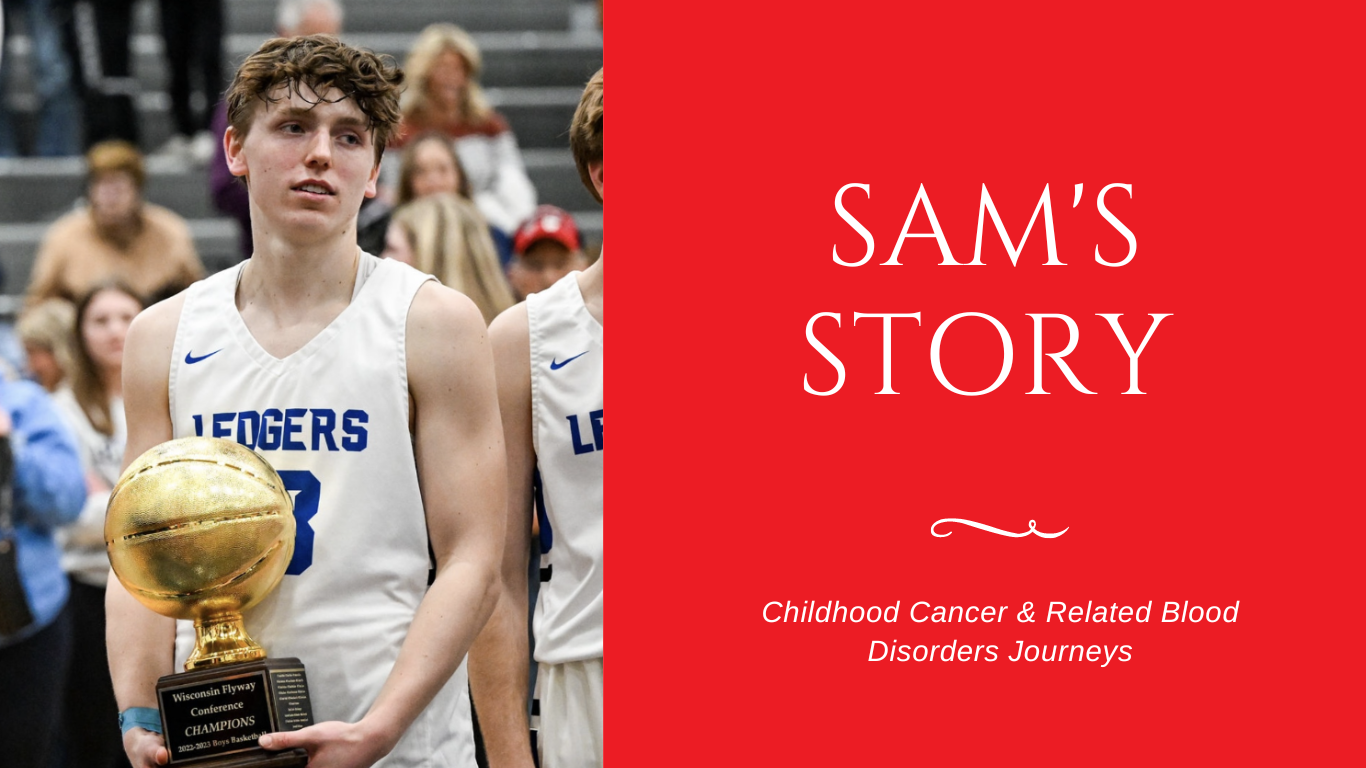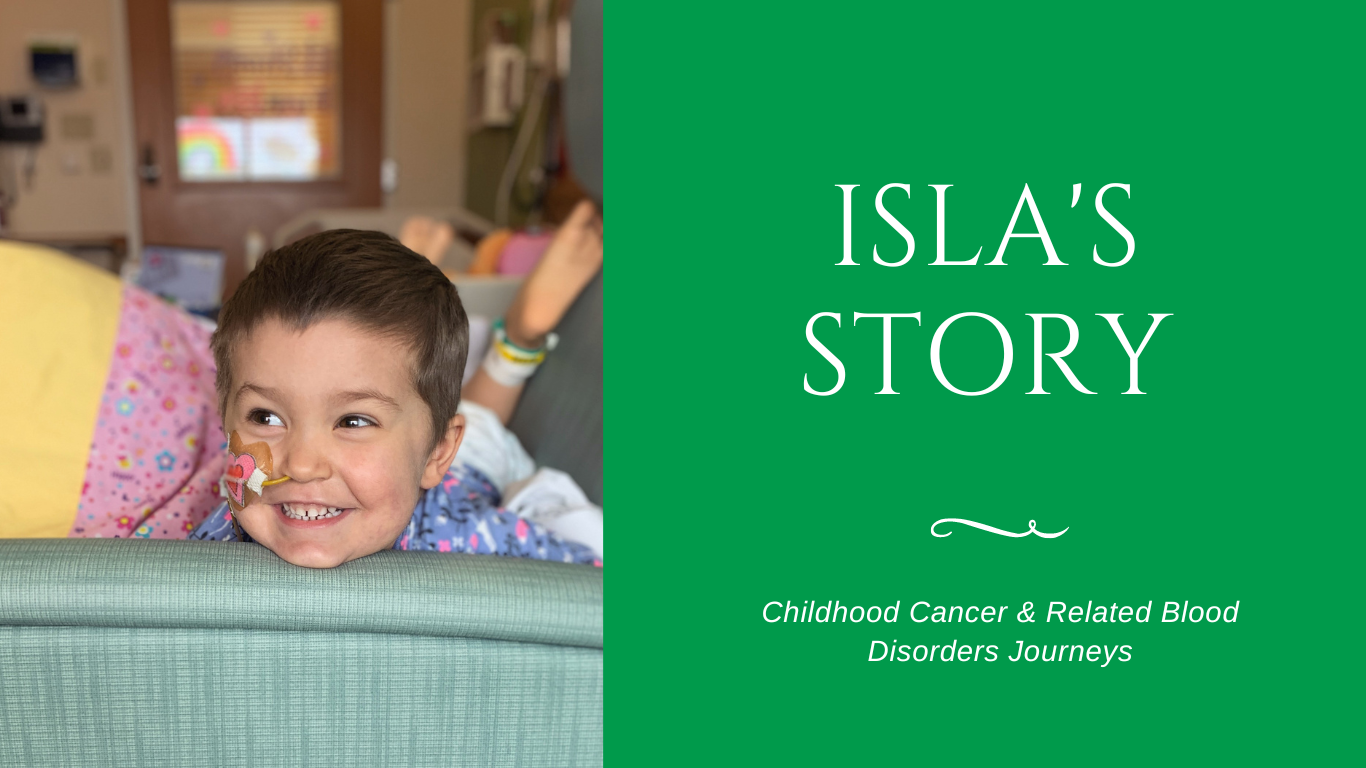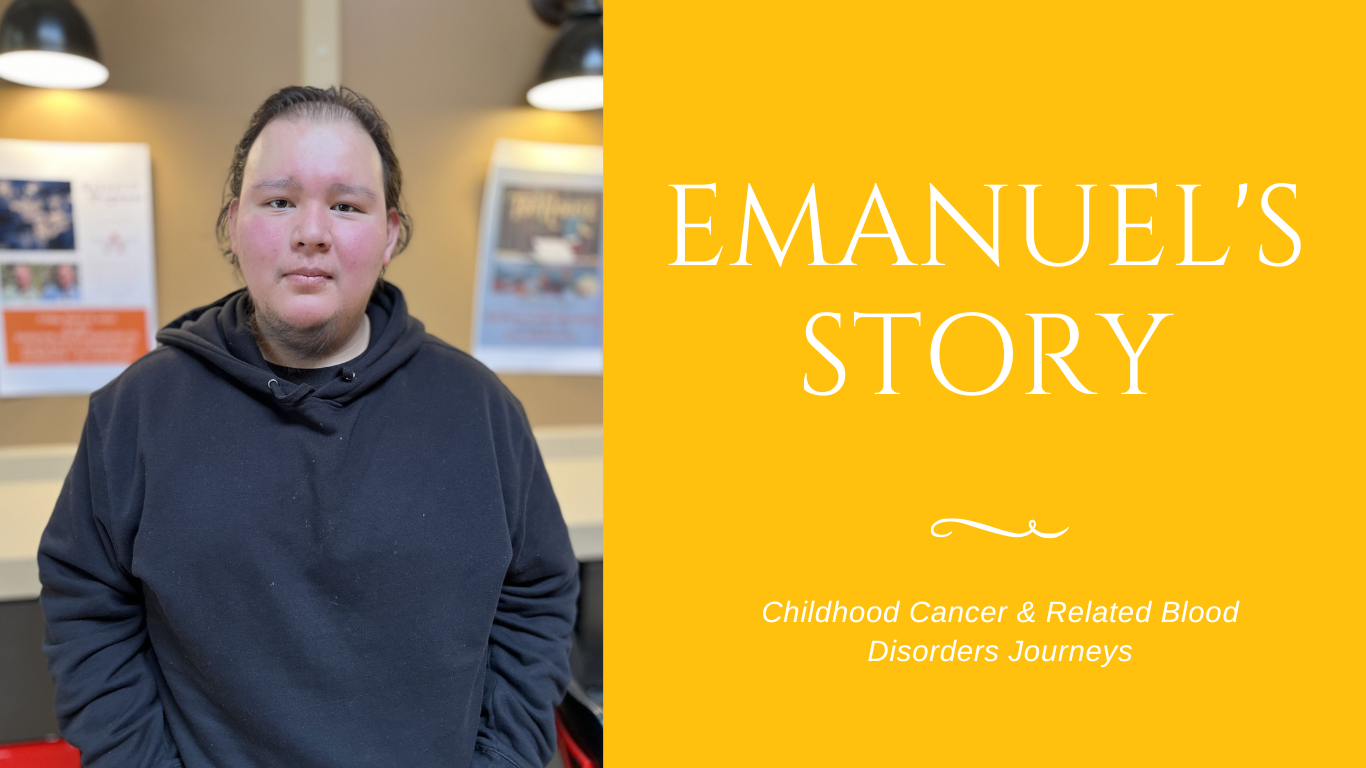
Harlow’s Story
Age: 13
Diagnosis: B-cell Acute Lymphoblastic Leukemia
Favorite Things: spending time with family, NBA/NFL stats, playing volleyball
Meet Harlow, a thirteen-year-old with a huge heart for others and a whole lot of grit. She is the oldest of two sisters and loves spending time with her tight-knit family. Harlow enjoys following NBA and NFL stats and playing volleyball with her friends.
In the summer of 2017, seven-year-old Harlow began experiencing symptoms that raised some red flags for her mom, Nora. Harlow had been complaining about pain in her legs and developed a persistent, on-and-off low-grade fever that lasted a full week. When Harlow developed two very deep bruises that would not fade, Nora knew something was off and took her daughter to the pediatrician. The doctor noticed swollen lymph nodes and, once she saw the significant bruising, sent Harlow for immediate labs. Within a couple of hours, the lab results landed them in the emergency department for a long night of tests and exams.
As they waited in the ED, Nora’s gut told her this wouldn’t end well, but the thought of cancer still felt utterly implausible. Cancer is something that happens—but to others—not to your own child. That evening, Harlow and Nora waited with a pit in their stomachs, filled with fear of the unknown. They whiled away the long hours watching The Descendants, and when the song “You and Me” played, a wave of emotions crashed over them.
“…We’ll look deep inside
And we’ll rise up and shine
We can be bold
We can be brave
Let everyone see.”
That night—as the unknown stretched before them—Harlow and Nora chose to be brave, to be bold, to fight from deep within. That night, Harlow was diagnosed with leukemia and moved to the fifth floor of Children’s Wisconsin, the MACC Fund Center.
Despite the weight of the diagnosis, Nora still clung to a flicker of hope- hoping to awaken to the doctors admitting an error, reassuring her that Harlow only had a minor blood disorder. The transition to the MACC Fund Center that night felt nothing but surreal for Nora. As their first nurse presented Harlow with a pillowcase and blanket, Nora wondered, “Why do they think we’ll need these? When are we going home?” The shock of their new reality, their family’s new normal—a life in and out of the hospital, the new home away from home—took time to sink in. Yet, the genuine care and warmth shown by the nursing staff from the moment they arrived brought a great deal of comfort. It was evident that this place was truly special.
The next day, Harlow’s family received her official diagnosis of B-cell Acute Lymphoblastic Leukemia, and she began her first round of chemotherapy. Despite their overwhelming fear, Harlow’s family found reassurance in knowing they would be in capable and caring hands throughout the journey.
One month after Harlow’s diagnosis, her family received the crushing news that Harlow’s 23-year-old cousin, Makaela, with whom she shared a deep bond, had died very tragically. And, in the wake of this heartbreaking loss, Harlow’s medical team delivered the news that the standard treatment had proven ineffective in bringing Harlow into remission, and she was classified as high-risk. This dual blow was devastating to the whole family, casting a shadow of uncertainty over their collective future. Nora recalls this as the most terrifying time for her, yet Harlow’s oncologist reassured her. “Yes, Plan A didn’t work. However, I have a Plan B, C, D, and E. We will just move on to the next thing.” And with that, they chose to pick themselves up and move forward with the next steps, strengthened by the belief that Makaela’s spirit was with Harlow every step of the way.
Harlow’s battle against leukemia now demanded a far more aggressive approach through six distinct phases of treatment. And after four months on this new path, Harlow’s family was elated to hear that Harlow finally had no evidence of disease. Throughout the next phases of her treatment, which spanned two years in total, young Harlow astounded her family as she conquered every hurdle that crossed her path—every three months, a new phase of treatment to contend with, two different visits to the ER for sepsis, a period of time in the ICU, missing school for a full year—taking everything in stride.
Harlow doesn’t remember much from this time, but one memory stands out vividly: the spinal taps. Typically, children undergo anesthesia for spinal taps, but Harlow reacted terribly to it. At just seven-years-old, Harlow made the brave decision to endure the procedure while awake- a parent and child life specialist by her side through it for support. She became the youngest child at the hospital to do so, setting a trend for other children facing similar struggles.
For seven-year-old Harlow to endure a spinal tap fully awake, it looked like this: numbing cream was applied to her lower back, and once it had taken effect, Harlow would lie on her side in a fetal position. She’d listen to the soundtrack of The Greatest Showman and focus on breathing deeply. The medical team would talk her through each step as a long needle was inserted to collect spinal fluid, followed by an injection of methotrexate into her spinal column. Afterward, Harlow would lay flat for 30 minutes before proceeding with additional treatments. Harlow unbelievably went through twenty-two of these procedures fully awake, breathing through it, toughing it out.
In the fall of 2019, just before reaching the end of her treatment, Harlow received a special request: to design the TMJ4 MACC*Star for that year’s holiday season. When thinking through the design, Harlow chose to draw the star as a sunflower, her cousin Makaela’s favorite flower- her way of sharing this honor with her beloved cousin who was with her in spirit through her entire fight.
That holiday season, Harlow rang the bell to mark the completion of her treatment. However, like many survivors, her fight did not end in that symbolic moment. Harlow still grapples with what is commonly referred to as “chemo brain”- a cognitive fog affecting up to a third of childhood cancer survivors. Her family has collaborated with Harlow’s school to accommodate her additional needs stemming from this condition. Additionally, she contends with joint pain in her ankles, a lingering effect of the chemo drugs and steroids notorious for decreasing bone density. The pain she endures while playing most sports keeps her from joining any teams despite her love of the games.
But perhaps most significantly, Harlow, is working through a great deal of anxiety, impacting many areas of her life. Despite being five years post-treatment and unable to remember much of her battle, her body has retained the trauma, triggering these responses. Unfortunately, this type of anxiety in childhood cancer survivors is incredibly common and well documented. It’s important to Harlow that people understand both the physical and mental long-term impact that pediatric cancer has on survivors. And Nora emphasized, “You’re never truly finished with cancer. People don’t understand the aftermath of something like this. They see the child’s hair grow back and think they are done. But they aren’t done. It stays with them.”
The cancer experience also profoundly shapes the caregivers who support their children through treatment. Nora, driven by a deep compassion for caregivers, is now co-facilitating the MACC Fund’s new Care for Caregivers Support Network alongside Melissa Minkley, MSW. This monthly gathering offers a dedicated space for caregivers of children undergoing treatment at the MACC Fund Center to prioritize self-care and find community with others navigating a similar journey.
And though Harlow is still working through how cancer has and will continue to shape her life, she is looking forward to all the adventures awaiting her in high school and beyond. Once she graduates, she would love to attend college “somewhere warm” and aspires to become a sports reporter, aiming to “be the next Erin Andrews.”
Harlow and Nora share a vision of a future where every child can proudly bear the title of survivor. A future where innovative treatments alleviate the trauma and anxiety associated with childhood cancer, empowering every child to embrace their future with confidence.
Thank you for supporting research. Thank you for giving hope.
Copyright protected work of the MACC Fund. May not be used or distributed on behalf of any other organization or commercial purpose without MACC Fund’s explicit consent.




